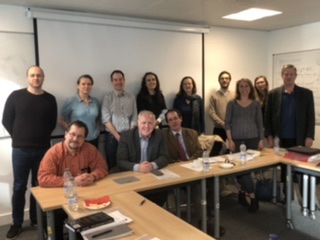
 A workshop organized by the Anti-Politics Specialist Group of the UK Political Science Association and hosted in LSE’s Media and Communications Department brought together an inter-disciplinary group of scholars to discuss two key questions: why are people so angry with politics, and what can be done about it? Here Gergana Dimova, convener of the Anti-Politics Specialist Group and Lecturer at the University of Winchester, and Eva Połońska-Kimunguyi, a Research Fellow in the Department of Media and Communications at LSE, analyse and explain the themes of the workshop.
A workshop organized by the Anti-Politics Specialist Group of the UK Political Science Association and hosted in LSE’s Media and Communications Department brought together an inter-disciplinary group of scholars to discuss two key questions: why are people so angry with politics, and what can be done about it? Here Gergana Dimova, convener of the Anti-Politics Specialist Group and Lecturer at the University of Winchester, and Eva Połońska-Kimunguyi, a Research Fellow in the Department of Media and Communications at LSE, analyse and explain the themes of the workshop.
Understanding “anti-politics” is perhaps more important now than ever before. After all, if people distrust politicians, how are they to follow their orders and observe quarantine for weeks on end?
How angry are people, exactly?
Not all public anger is created equal and not all anger directed at the government is insidious. At the workshop, Gerry Stoker (University of Southampton) pointed out that that it is important to distinguish between healthy cynicism that is well placed, when the government is acting in a malevolent manner, and erosive trust, which a priori negates all potential achievements of the government. The TrustGov project will collect data comparing empirical patterns of trust in political institutions across the world. One of the key puzzles that the project will resolve is this: how do we operationalise and measure various types of mistrust?
Why are people so angry, really?
By now, the sources of public grievances are well known: people are angry at the immigrants for taking their jobs away and unsettling their customs; people are angry at the selfish politicians; people are angry at supranational structures for eroding their country’s sovereignty.
The aim of the Anti-Politics workshop was to add new conceptualizations of the drivers of anti-politics, which may have been hitherto neglected. Its primary goal was to build an inter- disciplinary understanding of anti-politics and to seek interdisciplinary solutions, based on scholarly expertise from the fields of media studies, politics, economics and sociology.
 The message from media studies is not a rosy one: the ‘mediatization’ of political communication, or media-driven democracy, is here to stay. Monica Horten (LSE) suggested that politicians use the media to make distorted statements, which subversively push people to make choices that do not benefit them in the long run. The crisis in public information, dis-information and mis-information, waning trust in media, journalism and platfrom credibility as well as on-line political communication are some of the themes that LSE’s Media and Communication Department has been working for a while.
The message from media studies is not a rosy one: the ‘mediatization’ of political communication, or media-driven democracy, is here to stay. Monica Horten (LSE) suggested that politicians use the media to make distorted statements, which subversively push people to make choices that do not benefit them in the long run. The crisis in public information, dis-information and mis-information, waning trust in media, journalism and platfrom credibility as well as on-line political communication are some of the themes that LSE’s Media and Communication Department has been working for a while.
But then again, it has been noted before that politics based on lies is by no means new. Niccolò Machiavelli taught us some 500 years ago that interpersonal manipulation, callousnesss and indifference to morality are keys to success in the world of politics and political communication. Politics, he wrote in ’The Prince,’ requires ’inhuman cruelty’ which he refered to as a virtue. In a similar vein, in her essay on ’Lying in Politics’ written in 1971, Hanna Arendt reflected on the various ’aspects of deception, self-deception, image-making, ideologizing, and defactualization’. She made a connection between the mediatized public relations and the deterioration of politics. Both could now be blamed for forging the post-truth reality and for alienating consumers of news media and voters.
Hence, truth and politics have formed a symbiotic relationship over the centuries. With the advent of technology and modern media industries, the use of spin, lies, falsehoods and semi-truths in the public domain has only been exacerbated, not produced anew.
From an economics perspective, people may be angry at the neoliberal mode of capital accumulation (David Bailey, University of Birmingham). Just-in-time production and run-away capitalism that relocate production to far-away places, impact the size and strength of domestic labor force, and diminish workers’ capacity to form trade unions and challenge national governments about the terms of industrial policy. The growing influence of trans-national business on national politics shifts power away from voters to markets, to large corporations that have outgrown the governance capacity of individual nation states.
Alternatively, anger could arise because the disproportionate structural and instrumental power of the financial sector puts democratic processes and fair public provision at stake (Ewa Karwowski and Bruno Bonizzi, the University of Hertfordshire). Hyper-financial mobility strengthens the structural power of capital over labour and the state. The ‘electronic herd’ makes instant decisions that cannot be matched by the much slower democratic political decision-making structures. Global financial markets are naturally volatile and precipitate economic and political instability. On the other hand, “technocratic” decisions are often channelled through financial markets, which thus acquire infrastructural power. By strengthening the power of financial markets over the state and of business over workers, globalization undermines the mutually beneficial tension between capitalism and democracy. Hence, the overall impact of the ‘golden straight-jacket’ of globalization is, as Tom Friedman wrote in The Lexus and the Olive Tree, ‘when you put it on, your economy grows, and your politics shrinks.’ Democracies cease to represent those for whose benefit they were created in the first place: voters and their interests.
Changes in the media and economics lead to changes in politics. Perhaps it is the style of governance – in particular, the propensity of public officials to depoliticise decision-making – that helps account for public disaffection with politics (Jim Buller, University of York). In addition, there has been a weakening of the political importance of ordinary working people, a trend that has signalled a transition towards a post-democratic society. Occupations that generated the labour organizations that once powered the rise of popular political demands have now declined. The outcome is an economically impoverished and politically passive population that has not generated organizations to articulate its demands. Therefore, ‘the people’ are increasingly unwilling and unable to participate in politics.
Politics thrives when there are major opportunities for ordinary people to actively participate in shaping public life. Democratic equality requires certain socio-economic equalities to allow citizens to affect political outcomes. As Thomas Piketty argues, ‘extreme inequality is just not useful, it’s not useful for growth, and it’s bad for democracy.’
The social aspects of the recent economic and political changes are also important. Cheap migrant labour affects mostly the poorest populations in the host countries. Migration threatens national culture and identity. It increases inequality and creates a new class of state-less and citizenship-less people. It promotes cultural and xenophobic backlashes, changing values and attitudes in the mass electorate in host countries that challenge liberal norms and liberal politics and make room for authoritarian governments.
As Sean Hanley (UCL) noted, understanding anti-politics reminds him of the parable of the blind men who were feeling the elephant from different sides. Similarly, the workshop demonstrated that scholars of different disciplines are exploring the phenomenon of public anger from different angles. By amalgamating these disparate perspectives from various disciplinary perspectives, including media, politics, economics and sociology, the workshop participants concluded that the anti-politics research is facing the serious challenge of gauging the relative explanatory power of these explanations.
What is the best fix for anti-politics?
The good news that there is a wealth of fixes for anti-politics, as the workshop participants demonstrated. For instance, Daniele Albertazzi’s ESRC project “The survival of the mass party: Evaluating activism and participation among populist radical right parties (PRRPs) in Europe” is exploring how PRRPs, far from being one-person machines, can often invest in large scale grass roots organizations. One take away from this project is that mainstream parties should reconsider the value and merit of activism and presence on the ground as a way to re-engage citizens.
Other solutions for anti-politics include even more fundamental changes. One such fix, proposed by Frank Vibert’s book Making a 21st Century Constitution: Playing Fair in Modern Democracies, is to rewrite the constitution. To battle anti-politics, the new constitution should place a new focus on inter-generational differences and representation and provide a larger place for methods of direct participation alongside representation.
Another remedy, developed by the Horizon 2020 REDEM project presented by Elise Roumeas (Sciences Po), is to re-engage citizens with elections. This innovative approach examines the ethical dilemmas faced by voters in different electoral systems. It is by taking seriously the ethics of voting, and specifically the morally painful choices that citizens face in elections, that new ways of engaging citizens with elections can be identified and developed. Gergana Dimova’s book Democracy beyond elections: Government Accountability in the Media Age argues that the best way to bring back people’s belief in politics is to ensure a thorough accountability process not only through elections, but also in between elections.
Finally, there is the view that the solution will come from the citizens, not the state. The process will play itself out naturally as disgruntled citizens take their grievances to the streets. Based on an original database of nearly 3000 protests in Britain for the period between 1985 and 2020, David Bailey will assess to what extent protests are effective in channeling grievances. The more effective they are, the less disillusioned citizens will presumably be.
We do not know yet which of these fixes will work. But it is certain that research on anti-politics is propelled by momentum, which stems from the dire societal problems it seeks to analyze. And we are more likely to uncover the cure if we work together across our disciplinary specialisms.
This article represents the views of the author and not the position of the Media@LSE blog, nor of the London School of Economics and Political Science.





